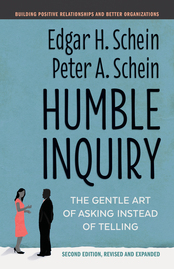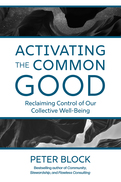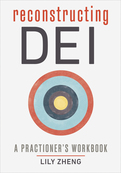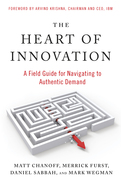1 To Boldly Tell or Humbly Inquire
Conversations go wrong sometimes. Friends, family, and colleagues tell us things we don’t want to hear, or they fail to tell us things that would improve matters. We unwittingly offend people by telling them things they don’t want to hear. Discussions turn into arguments that end in stalemates and hurt feelings. It is critical, now more than ever, to examine what went wrong. If we just let it go, we have a much harder time sorting out later how we can do better with each other the next time we fail to communicate. Can we learn how Humble Inquiry could positively impact our daily conversations, and what can go wrong if it is not used at crucial moments?
Ed’s Graudate Student in the MIT Sloan Program
The graduate student was studying for an important finance exam in his basement study. At the family dinner he had explicitly instructed his six-year-old daughter not to interrupt him. He was deep into his work when a knock on the door and a cheery “Hi, Daddy” announced the arrival of his daughter. He said sharply, “I thought I told you not to interrupt me.” The little girl burst into tears and ran off. The next morning his wife berated him for upsetting the daughter.
He defended himself vigorously by reminding his wife that he had explicitly told the daughter not to disturb him, until his wife interrupted and said, “I sent her down to you to say goodnight and ask you if you wanted a cup of coffee to help with your studying. Why did you yell at her instead of asking her why she was there?” He did not have any further defense and sank into guilty self-absorption, realizing that he not only had a lot of fence mending to do with both his wife and daughter, but he also began to reflect on a deeper question: why did he yell at his daughter instead of humbly inquiring why she was there? He had to admit to himself that he should have been curious about this violation of his dinnertime order.
If you have ever been in this kind of situation, how could you have done better? The key to Humble Inquiry is to recognize when you need to know why something is happening instead of giving in to a knee-jerk impulse that not only keeps you ignorant but also creates an avoidable disconnect. How can you catch yourself in time to humbly inquire what is going on instead of giving in to the impulse of telling and assuming that the world will follow your will?
The answer is simple, but its implementation is not. What if you tried these three things: (1) Learn to see, feel, and curb the impulses to lash out; (2) Learn to make a habit of listening and figuring out what is going on before taking action; and (3) Try harder to hear, to understand, and acknowledge what others are trying to express to you. What we ask, when we ask it, the particular form in which we ask it, and how we hear and understand the answer—a successful handling of these building blocks will increase the level of trust in our relationships, which, in turn, will reenforce better communication and collaboration.
The husband and wife in this example could revisit this situation with a Humble Inquiry attitude and explore several further questions. Did she really hear the intensity of her husband’s anxiety about not being interrupted? In that regard, he might well ask, “Why did you send our daughter down instead of coming down yourself?” He might also humbly ask, “Do you understand how anxious I am about this finance stuff and how hard it is for me to concentrate on it?” That might well precipitate an apology from his wife for her punishing morning comment, he might apologize for having lost his cool with the daughter, and the relationship would benefit from the focus on Humble Inquiry in reviewing the situation.
If smoother conversations and comfortable relationships could be achieved by each of us just doing our own thing, all of this might not matter. But if we are on a seesaw (metaphorically speaking) or running a relay race together, it may matter a great deal. Good relationships and open communication are essential when all the parties are completely simultaneously interdependent. The baton pass has to work or the race is lost. Recognizing those situations of interdependency then becomes crucial because that is when Humble Inquiry often provides an opportunity that could have easily been missed.
Let’s look at an interesting example of how Humble Inquiry might have improved the situation where telling was used, and what the Humble Inquiry alternative might have been:
Jim, the quarterback of a professional U.S. football team, and Rob, his right guard (and therefore the player responsible for protecting him from opposing defensive linemen) are in the locker room after a game.
Jim: Rob, you have to do better. I got rushed and sacked too many times in today’s game.
What struck us about this interaction was not whether this rebuke in the form of a tell was appropriate, but what the implications were for the future of this relationship and the team’s performance. It is quite possible that Jim had every right to give Rob that feedback, and possibly Rob took it to heart and decided that he would try harder or alter his technique. Yet from the Humble Inquiry point of view, they missed a great opportunity that might have gone more like this.
Jim: Rob, we have to do better. I got rushed and sacked too many times in today’s game. Any thoughts? (Humble Inquiry)
Rob: Well I can certainly try harder and adapt to keep you better protected, but I need to let you know that the team we are playing in two weeks has a defensive lineman opposite me who you and I know is a perennial all-star and may beat me every time. So, on that Sunday let’s plan for you and the coach to call a different set of plays because I am pretty sure I will have a harder time protecting you adequately on that day.
Jim: It’s great that you pointed this out, lets both talk to the coaching staff about it, and work up a plan. Thanks.
Had Jim approached Rob with Humble Inquiry, as in this re-imagining of their conversation, they could have opened up an important channel of communication that would not only improve team performance but also strengthen Jim and Rob’s personal relationship, which might motivate Rob to work out some tactics with Jim that would benefit Jim’s performance. The key to the second version is Jim seeing it as a we situation and asking Rob what Rob thought about it, which would have communicated to Rob that Jim was genuinely curious and interested in what Rob’s solution might be to Jim’s getting rushed and sacked so much. The two interdependent players could eventually have built a more personal relationship of the sort that coaches of winning teams often talk about: teammates who really trust each other. You only get there if you think in terms of we.
To fully understand the relational implications of Humble Inquiry we need to review our model of the levels of relationship that are broadly prescribed in our society.
Level –1 (domination) is basically a negative relationship characterized primarily by the more powerful telling the less powerful what to do and rejecting efforts to form more equitable relationships.
Level 1 relationships are transactional, based on formal role definitions and are characterized by the degree of professional distance that is intentionally maintained between peers (often competing peers). In the work setting, the degree of interdependency is prescribed by the formal roles: management is primarily a telling process. Humble Inquiry and positive relationship building might be viewed with suspicion or considered irrelevant and inefficient.
Level 2 implies getting to know each other at a more personal level in order to develop a higher level of openness and trust, what we refer to as building a positive relationship. In a conversation, telling individuates the parties as teller and listener. Humble Inquiry functions first as an invitation to get closer and more personal and, thereby, enables the sense of we, which may then level off and normalize where both parties are comfortable.
In the work setting it will plateau when the team members know each other well enough in relation to their work to be able to handle surprises and complexities. Level 2 relationships offer the promise of flexibility, adaptability, and resiliency, which derive from group members and their leaders learning the gentle art of asking instead of telling.
Level 3 relationships of friendship or love may grow in the more personal and social setting, from a Level 2 relationship, fed by a more consistent Humble Inquiry attitude. People who achieve that level of openness and trust often describe it as really seeing each other. This may be thought of as intimacy, and it may actually be entirely appropriate in work settings, provided it does not engender nepotism, favoritism, or other emotionally driven distortions of management decision-making.
TABLE 1.1 Levels of Relationship
Relationship Level |
Descriptor |
Level –1 |
Domination/exploitation |
Level 1 |
Transactional (professional distance) |
Level 2 |
Personal (openness and trust) |
Level 3 |
Intimacy |
To summarize, telling is most consistent with strangers or casual acquaintances chit-chatting, sharing stories, and otherwise transacting in a Level 1 relationship that is based on societal and cultural norms of etiquette, good manners, and tact. As we learn to be more open and trusting, to tell each other what is really going on, we can effectively adapt to new and difficult circumstances. The key is to invite others through Humble Inquiry to move toward a Level 2 relationship.
What Are Some of the Traps in Telling?
Many of us experience an everyday work climate in which the preponderance of telling can make it very difficult to ask, especially to ask in a humble way. Unfortunately, as we noted with Rob and Jim, telling may cut off or preempt the sharing of important information. In addition, telling temporarily puts the other person down. It implies that the other person does not already know what is being told and, by inference, that the other person ought to know it.
We know this feeling well from our own experience of not liking to be told; we generally don’t like to be given advice unless we have asked for it. When someone tells you something that you did not ask about, don’t you often already know the answer and wonder why the person assumes that you don’t? Maybe you even feel offended when you are told things that you already know, are told how to feel about something, or are given unsolicited advice. Didn’t Rob already know that he had to do better?
Gratuitous telling betrays three kinds of arrogance: (1) that you think you know more than the person you’re telling, (2) that your knowledge is the correct knowledge, and (3) that you have the right to structure other people’s experience for them. We need to recognize these as traps that we fall into easily and not be surprised or angry if others feel put down. The elderly lady who told Ed about mushrooms not only had incorrect information but also had not been invited to tell Ed anything. Her good intentions to be helpful did not save the situation. The Sloan student who yelled at his little daughter fell into the trap of not knowing why the daughter was there, putting his own needs first, and arrogantly believing that his parental authority was not to be disobeyed. Jim the quarterback fell into a similar trap when he failed to ask Rob for his thoughts on the situation and ideas for possible improvements.
On the other hand, when you genuinely ask, you temporarily empower the other person in the conversation and make yourself vulnerable, for a time. You have also opened the door to the possibility of deepening a relationship. The other person may choose to enter the relationship with you but may also belittle you, laugh at you, or in other ways take advantage of you instead of taking you seriously. How you ask the question may also predetermine the direction of the conversation, as is illustrated by this old tale about a traveler and a local (in the days before GPS).
Asking for Directions the Wrong Way
A traveler, on her way to a small town in a rural northern state, stopped at an intersection to ask a local sitting on his porch which of two roads to take.
Traveler: If I take this road, will it lead to Woodford?
Local: Yep, that road will lead you to Woodford.
Traveler: What if I take this other road, will it lead to Woodford?
Local: Yep, that road will also lead you to Woodford.
Traveler: Well, does it make any difference which road I take?
Local: Not to me it don’t!
Our traveler assumed the local would care—generally not a bad assumption—but was she ready for the local’s indifference? Was the question really Humble Inquiry? Perhaps not. The way she began, “If I take this road,” was impersonal and treated the local as just a source of information. Had the traveler said, “I’m looking for the best road to get to Woodford. Can you help me?” that might have drawn the local more personally into the situation and displayed a vulnerability that he might not have ignored so easily.
If you don’t care about improving communication or building a relationship with the other person, then telling or being impersonal in your questions, as above, may be just fine. But, if some of the goals of the conversation are to improve communication and build a relationship, then it is fair to generalize that telling is less effective than humbly inquiring.
The closed question that comes across as a tell can also be dangerous in leading to misinformation or miscommunication. Asking which road led to Woodford was a closed question trap that demanded an answer yet made it harder for the local to reveal what he did or did not know. Perhaps the local had never heard of Woodford or had little patience to engage at all. A closed question may make it much harder for the person being asked the question to concede “I don’t know.” Worse, it might encourage a casual guess or the withholding of relevant information simply to get the conversation over with.
Successful conversations that lead to productive Level 2 relationships typically start with the assumptions of sociological equity and balance. The wrong kind of tell immediately imbalances the relationship by explicitly or implicitly putting the other person down. If you want to build a relationship, you need to begin by investing something in it. Telling is only an investment if you know for sure that what you are telling is of value to the other person. That is why it is safest to tell only if you have been asked, rather than arrogantly deciding on your own to tell somebody something. It is not unlike when someone chooses to give us feedback—it matters a great deal whether we have asked for it. We only find it really useful when we have asked for it in relation to some goal that we are trying to achieve. You know how you feel when someone says, “Do you mind if I give you some feedback?” There are few among us who are not a bit put off by this because it is not a sincere ask; it is a tell, and probably contains implicit or explicit criticism. After all, if the feedback is positive, it would probably not be preceded by “Do you mind if …”
Humble Inquiry is an investment in that you are expending some of your attention up front, admitting your ignorance, and giving the other person some power. Your questions convey to the other person, “I am prepared to listen to you and am making myself vulnerable to you.” You will get a return on your investment if what you learn is something that you did not know before. You will then appreciate that you have been told something new, and a positive relationship can begin to develop through successive cycles of asking and responding in which each of you is receiving value through what you learn. In the case of our northern state local, there was a transactional Level 1 exchange, but the value received was not mutual or equal. The relationship had no real basis to develop beyond the one-way exchange.
When there is mutual interest, trust can develop because you have made yourself vulnerable, and the other person has neither taken advantage of you, nor ignored you, nor given you false information. Trust builds for each person because each has shown an interest in and paid attention to what the other person said in response to each question.
A conversation that builds a trusting Level 2 relationship is, therefore, an interactive process in which each party invests and gets something of value in return.
Civility and Here-and-now Humility
All of this occurs within the scripted boundaries of what is considered appropriate good manners and civility in our particular cultural context. Participants exchange information and attention in successive cycles guided by each of their perceptions of the relative cultural boundaries of what it is appropriate to ask and tell in that moment. To fully understand the importance of Humble Inquiry in this cultural context, we need to go back again to the concept of Here-and-now Humility in conversations, relationship building, and task accomplishment. Humility is a very broad concept ranging from its meaning as a character trait to the meaning we wish to emphasize here as a particular feeling in the here-and-now situation. Even the most narcissistic arrogant characters can feel humble in a situation that they cannot understand or control. Even the humblest characters can feel arrogant when they know the answer and are in control of the situation. The trick is not to be preoccupied with personality traits but to learn to read the immediate situation and one’s role in it in order to choose wisely when it is important to be here-and-now humble.
To amplify what we said in the introduction, Here-and-now Humility is how you feel when you realize that you are dependent on someone else in the situation. Your status is inferior to the other person at that moment because he or she knows something or can do something that you need in order to accomplish your task or goal. This other person has the power to help or hinder you in the achievement of goals that you are committed to. The traveler who wanted to get to Woodford leaned toward specific questions that only requested yes or no responses. She did not ask for help; she asked for a judgement on a tell (“Does this road lead …”) rather than “Which road …” She got an accurate answer and could have been quickly on her way with the first choice. But that question did not include the possibility that the local had other relevant information and may have been willing to share it.
She did know enough to seek more information, yet again in a second telling manner, she obtained an accurate answer. Did that answer help her make the decision? She did not become aware of her actual dependency for information in this situation. She tried to stay in control with her questions rather than asking for help. The traveler would have been best served if she could access her ignorance and humbly ask additional clarifying questions.
Is all this hairsplitting of a trivial example really necessary? Don’t we all know how to ask? As the next chapter illustrates, accessing one’s own ignorance, or recognizing one’s own Here-and-now Humility is not so easy in a culture where we have so many ways of asking that are really telling in disguise. You can then either abandon tasks that make you dependent on others or you can deny the dependency, avoid ever feeling humble, fail to get what you need and, thereby, risk failing to accomplish the task. Failing to accept Here-and-now Humility is often tantamount to effectively sabotaging your own efforts. And people do this all the time. Some would rather risk failure than admit their dependency on someone else. This is as American as rugged individualism.
As we pointed out in our preface and introduction, the problems we face that are increasingly multifaceted, systemic, fluid, and interdependent will require us to learn how to abandon the less effective Level 1 transactional telling modes of adaptation and learn how to insert more expressions of the Humble Inquiry attitude to build the Level 2 relations that will reinforce more adaptive we behavior. This is explored in the next chapter.














